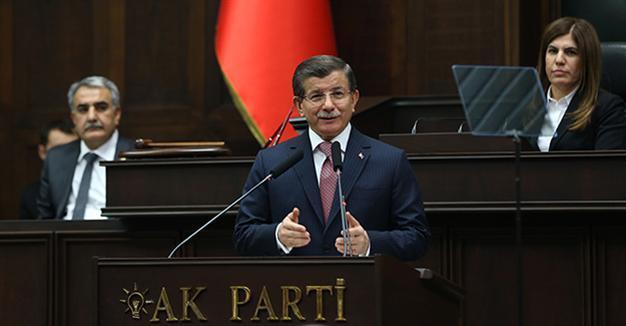Turkey against PYD in Syria talks, not Kurds: PM
ANKARA

AA Photo
Turkish Prime Minister Ahmet Davutoğlu has strongly reiterated his government’s categorical objection to the participation of the Syrian Kurdish Democratic Union Party (PYD) in U.N.-backed talks on Syria planned for later this week.“We believe there should be a table where Kurds, Arabs, Turkmens, Sunnis, Nusayris [Arab Alevis] and Christians are all together. The Kurds’ presence at the table is necessary,” Davutoğlu said Jan. 26 at a meeting with deputies of his ruling Justice and Development Party (AKP).
On the same day, the office of the U.N. special envoy for Syria said it had sent out invitations for peace talks in Geneva to start on Jan. 29, without specifying to whom.
“A table without Kurds will be lacking. However, we are against the [People’s Protection Units] YPG and the PYD, who repress Kurds, being at the table, but not against Kurds,” Davutoğlu said.
Meanwhile, Turkish Foreign Minister Mevlüt Çavuşoğlu said Turkey would boycott the peace talks if the PYD was invited to the table, adding that the three foreign ministers with whom he had spoken to in the last two days had promised him that this would not occur.
“Of course we will boycott [the Geneva talks] if the PYD is invited,” said Çavuşoğlu in a live show on NTV on Jan. 26.
Turkey has long opposed the PYD, which is playing a critical role in the fight against the Islamic State of Iraq and the Levant (ISIL).
Ankara considers the PYD and its military wing, the People’s Defense Units (YPG), to be offshoots of the outlawed Kurdistan Workers’ Party (PKK).
“Those who are recognizing them as a legitimate partner don’t live in the reality of the region. Nobody can convince us that these people are for peace,” Davutoğlu told CNN International in remarks aired on Jan. 25.
Meanwhile, Russian Foreign Minister Sergei Lavrov said it was impossible to reach a peace agreement in Syria without inviting Kurds to take part in the negotiating process, as it would be “unfair” and “counter-productive.”
“Without this participant [Syrian Kurds], the talks cannot achieve the result that we want, [which is] a definitive political resolution in Syria,” Lavrov was quoted as saying by AFP at an annual news conference, while adding that it was up to U.N. envoy Staffan de Mistura to decide which opposition groups to invite to the talks.
Çavuşoğlu talks to Kerry twice in two days
Meanwhile, Foreign Minister Mevlüt Çavuşoğlu resumed telephone diplomacy over the planned talks in Geneva. Çavuşoğlu spoke to U.S. Secretary of State John Kerry and British Foreign Secretary Philip Hammond on Jan. 26 while on a visit to Strasbourg to hold talks at the Council of Europe and the Parliamentary Assembly of the Council of Europe (PACE), diplomatic sources said.
Çavuşoğlu’s talks came a day after de Mistura said talks aimed at ending Syria’s brutal war will begin in Geneva on Jan. 29, after a delay over who would represent the country’s fractious opposition.
Çavuşoğlu and his U.S. and British counterparts exchanged views on planned negotiations and the “invitation to negotiations,” said the same sources, speaking under condition of anonymity.
On late Jan. 24, Çavuşoğlu conducted telephone conversations with both Kerry and French Foreign Minister Laurent Fabius and discussed the planned talks in Geneva.
Syrian opposition to decide on attendance at peace talks
The Syrian opposition cast doubt on whether it would go to the peace talks planned for Jan. 29, throwing U.N. diplomatic efforts into question as it accused the United States of adopting unacceptable Iranian and Russian ideas for solving the conflict.
The Saudi-backed opposition was meeting on Jan. 26 to decide whether to attend the talks which de Mistura aims to open in Geneva, ushering in months of indirect negotiations between delegates in separate rooms.
Opposition official Asaad al-Zoubi told Arabic news channel al-Hadath that he was pessimistic, though the final decision would be taken at the opposition meeting in Riyadh.
















